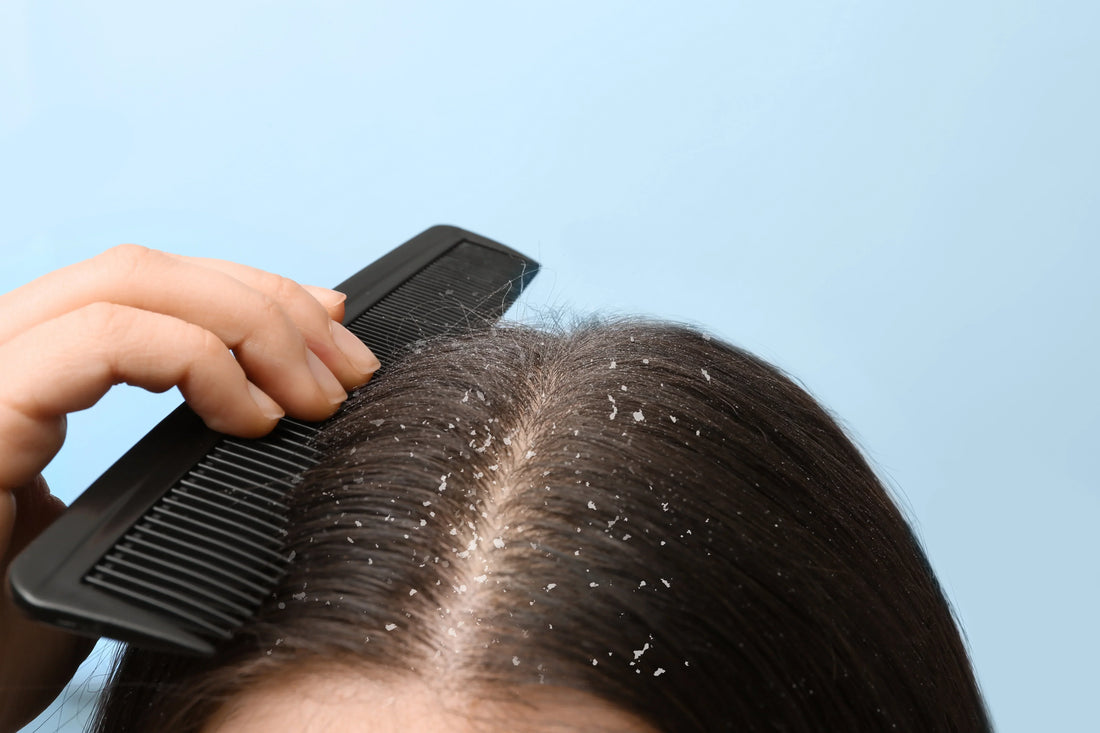
Effective Dandruff Treatments, Causes & Scalp Care Guide
Share
What is Dandruff?
Dandruff is a common hair and scalp problem that causes white or yellow flakes to appear on your hair and shoulders. Many people also experience an itchy scalp or skin irritation. While it isn't dangerous, dandruff can be frustrating and embarrassing.
It happens when the scalp sheds dead skin cells faster than usual. This flaking can be occasional or ongoing, depending on your scalp condition, care routine, and overall health conditions.
Common Causes of Dandruff
Dandruff doesn't stem from just one issue. Multiple factors can lead to flakes and itching. Understanding the root cause helps you treat dandruff more effectively.
1. Oily Scalp (Seborrheic Dermatitis)
Excess oil causes skin cells to clump and form greasy flakes. It affects areas like the scalp, eyebrows, and behind the ears.
2. Fungal Infection (Malassezia)
This yeast lives naturally on the scalp but can grow excessively, irritating the skin.
3. Dry Scalp
Cold weather, dehydration, or harsh hair care products strip away natural oils, leading to flaking.
4. Product Build-up
Overuse of styling products without proper cleansing clogs hair follicles and leads to flakes.
5. Poor Hygiene
Infrequent washing can lead to an accumulation of oil, sweat, and dead skin cells.
6. Skin Conditions
Dandruff can also be linked to skin conditions like scalp psoriasis and atopic dermatitis.
Why Dandruff Treatment Needs a Tailored Approach
Everyone’s scalp is different. To truly get rid of dandruff, you must select products and routines that match your specific needs.
- Oily scalp dandruff benefits from exfoliation and oil control.
- Dry dandruff needs hydrating, natural oils and mild care.
- Fungal dandruff often requires medicated shampoo with active ingredients.
One-size-fits-all doesn't work. To treat dandruff successfully, tailor your treatment to your scalp and symptoms.
Different Types of Dandruff
Knowing the type of dandruff you have can help you choose the right solution.
1. Dry Dandruff
This type results from a lack of moisture. It worsens in winter or after using drying shampoos.
Signs:
- Small, white flakes
- Tight, dry feeling scalp
- Itching, especially in cold weather
2. Oily Dandruff (Seborrheic Dermatitis)
Excess sebum combines with dead skin cells to create sticky, yellow flakes.
Signs:
- Greasy scalp
- Yellow or sticky flakes
- Red, itchy patches on the scalp
3. Fungal Dandruff (Malassezia)
Overgrowth of the fungus Malassezia leads to inflammation and flaking.
Signs:
- Large white/yellow flakes
- Intense itchiness
- Recurrence after stopping treatment
4. Product Build-Up Dandruff
Heavy use of hair care products can cause residue and flaking.
Signs:
- Waxy or sticky flakes
- Heavy scalp feeling
- Flakes disappear after deep cleansing
5. Psoriasis vs. Dandruff
Scalp psoriasis causes thick patches that don’t easily flake off and may spread beyond the scalp.
Quick Check:
- Dandruff: Light, loose flakes
- Psoriasis: Thick, silver patches with possible pain or redness
Most Effective Dandruff Treatments
The best way to treat dandruff is by using targeted treatments with proven active ingredients.
1. Anti-Dandruff Shampoos
Dandruff shampoos are a first line of defense.
Best ingredients:
- Zinc Pyrithione: Fights fungus and reduces flakes.
- Selenium Sulfide: Slows down skin cell turnover and oil production.
- Salicylic Acid: Gently exfoliates dead skin.
- Coal Tar: Reduces skin shedding; effective for scalp psoriasis.
- Ketoconazole: Strong antifungal used in medicated shampoo.
👉 Use these 2–3 times weekly, reducing as flakes improve.
2. Hair Serums and Scalp Lotions
Scalp serums can soothe irritation and dryness between washes.
Look for:
- Serums with tea tree oil or other essential oils
- Leave-in treatments for itch relief and hydration
3. Anti-Dandruff Hair Oils
Natural oils can hydrate the scalp and fight fungus.
Best oils:
- Coconut oil: Moisturizes and reduces fungal activity
- Tea tree oil: Has antifungal and anti-inflammatory benefits
- Neem and olive oil: Nourish and protect scalp health
👉 Use warm water to rinse oils thoroughly. Don’t leave oil in too long.
Home Remedies for Dandruff
Home remedies can be effective for mild symptoms of dandruff.
1. Apple Cider Vinegar
Balances pH and helps eliminate fungus.
How to Use:
Mix 50:50 with water and rinse scalp after shampooing
2. Aloe Vera
Soothes inflammation and hydrates.
3. Lemon + Yogurt
Lemon fights microbes; yogurt cools the scalp.
4. Fenugreek Seeds
Have antifungal properties.
5. Baking Soda
Acts as a gentle scalp exfoliant.
👉 Note: Home remedies help in the short term but are not a long-term solution for chronic dandruff.
Dermatologist Treatments for Dandruff
When over-the-counter treatments don't work, dermatologists can help.
When to Visit:
- Flakes persist beyond 4 weeks
- Redness, swelling, or pain
- Flakes spread to other areas
- You notice hair loss
Advanced Options:
- Prescription antifungal or medicated shampoos
- Topical steroids for inflammation
- Clinical scalp treatments (e.g., detox or peeling)
Preventing Dandruff from Coming Back
Hair Wash Routine:
- Wash your hair 2–3 times weekly (adjust for your scalp type)
- Use anti-dandruff shampoo only when needed
Hair Care Tips:
- Avoid over-oiling
- Rinse with warm water thoroughly
- Stay hydrated
- Choose gentle hair care products
Seasonal Adjustments:
- Use moisturizing shampoos in winter
- Use cooling, clarifying products in summer
Dandruff Myths vs. Facts
- ❌ “Oiling Removes Dandruff” — False. Oil can worsen fungal or oily scalp issues.
- ❌ “Dandruff is Contagious” — False. It's linked to your immune system and scalp condition.
- ❌ “Daily Washing Causes Dandruff” — False. Just use mild products.
Frequently Asked Questions
1. What causes dandruff?
Dandruff is often caused by a combination of dry scalp, overgrowth of Malassezia fungus, sensitivity to hair care products, or conditions like seborrheic dermatitis, scalp psoriasis, or atopic dermatitis.
2. Can dandruff lead to hair loss?
Dandruff itself doesn’t cause hair loss, but excessive scratching due to itchiness can damage hair follicles, leading to temporary hair shedding.
3. Which is the best dandruff shampoo to use?
Look for anti-dandruff shampoos with active ingredients like ketoconazole, zinc pyrithione, selenium sulfide, or salicylic acid. Choose a product based on your scalp type and sensitivity.
4. How often should I wash my hair if I have dandruff?
Washing 2–3 times a week with an anti-dandruff shampoo is usually effective. However, this may vary depending on how oily or dry your hair and scalp are.
5. Are natural treatments effective for dandruff?
Yes, remedies like tea tree oil, apple cider vinegar, aloe vera, and essential oils can help manage dandruff, especially for mild cases. However, they may not work for everyone.
6. Is dandruff contagious?
No, dandruff is not contagious. It is usually related to individual skin conditions, immune system responses, or reactions to hair products.
7. Can I prevent dandruff from coming back?
Yes. Regular use of dandruff shampoos, avoiding harsh hair care products, maintaining scalp hygiene, and managing health conditions like stress or hormone imbalance can reduce the risk of recurrence.
Summary
Dandruff is a widespread condition that affects millions of people globally. It results from the overproduction and shedding of skin cells on the scalp, often triggered by factors such as dryness, fungal infections, and underlying skin issues. Effective treatment includes the consistent use of anti-dandruff shampoos, maintaining proper scalp hygiene, and using natural remedies when appropriate.
Conclusion
While dandruff can be frustrating and persistent, it is manageable with the right approach. Understanding the root causes, using products with proven active ingredients, and adopting a consistent hair and scalp care routine can significantly reduce flakes and itching. For chronic or severe cases, it’s best to consult a dermatologist for a customized treatment plan. Ultimately, a combination of targeted care and healthy habits offers the best long-term defense against dandruff.
